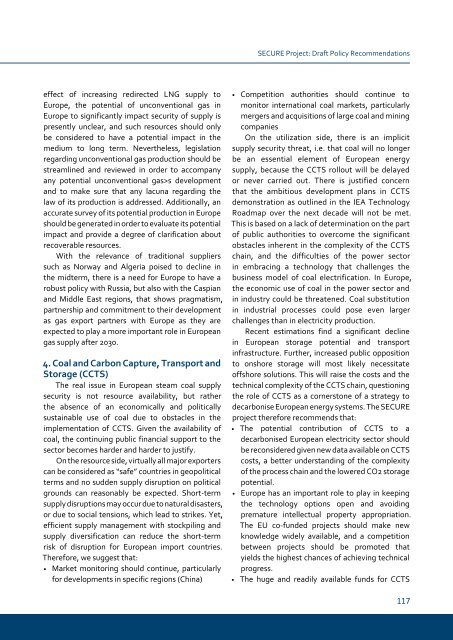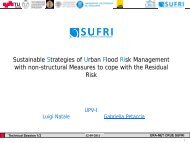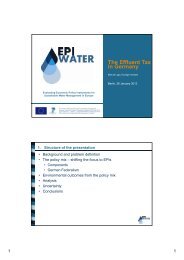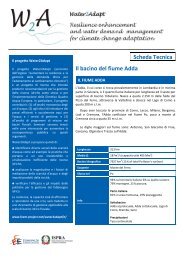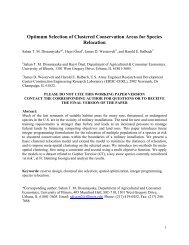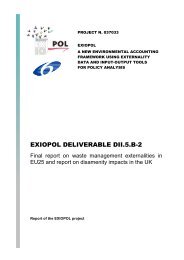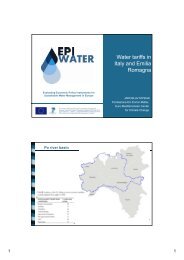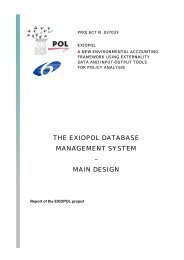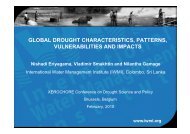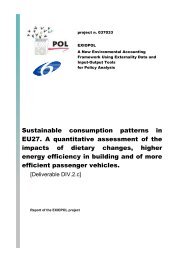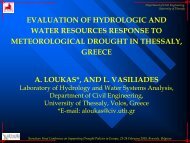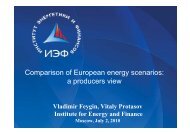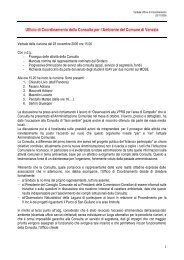Gulf and European Energy Supply Security - Feem-project.net
Gulf and European Energy Supply Security - Feem-project.net
Gulf and European Energy Supply Security - Feem-project.net
You also want an ePaper? Increase the reach of your titles
YUMPU automatically turns print PDFs into web optimized ePapers that Google loves.
effect of increasing redirected LNG supply to<br />
Europe, the potential of unconventional gas in<br />
Europe to significantly impact security of supply is<br />
presently unclear, <strong>and</strong> such resources should only<br />
be considered to have a potential impact in the<br />
medium to long term. Nevertheless, legislation<br />
regarding unconventional gas production should be<br />
streamlined <strong>and</strong> reviewed in order to accompany<br />
any potential unconventional gas>s development<br />
<strong>and</strong> to make sure that any lacuna regarding the<br />
law of its production is addressed. Additionally, an<br />
accurate survey of its potential production in Europe<br />
should be generated in order to evaluate its potential<br />
impact <strong>and</strong> provide a degree of clarification about<br />
recoverable resources.<br />
With the relevance of traditional suppliers<br />
such as Norway <strong>and</strong> Algeria poised to decline in<br />
the midterm, there is a need for Europe to have a<br />
robust policy with Russia, but also with the Caspian<br />
<strong>and</strong> Middle East regions, that shows pragmatism,<br />
partnership <strong>and</strong> commitment to their development<br />
as gas export partners with Europe as they are<br />
expected to play a more important role in <strong>European</strong><br />
gas supply after 2030.<br />
4. Coal <strong>and</strong> Carbon Capture, transport <strong>and</strong><br />
storage (CCts)<br />
The real issue in <strong>European</strong> steam coal supply<br />
security is not resource availability, but rather<br />
the absence of an economically <strong>and</strong> politically<br />
sustainable use of coal due to obstacles in the<br />
implementation of CCTS. Given the availability of<br />
coal, the continuing public financial support to the<br />
sector becomes harder <strong>and</strong> harder to justify.<br />
On the resource side, virtually all major exporters<br />
can be considered as “safe” countries in geopolitical<br />
terms <strong>and</strong> no sudden supply disruption on political<br />
grounds can reasonably be expected. Short-term<br />
supply disruptions may occur due to natural disasters,<br />
or due to social tensions, which lead to strikes. Yet,<br />
efficient supply management with stockpiling <strong>and</strong><br />
supply diversification can reduce the short-term<br />
risk of disruption for <strong>European</strong> import countries.<br />
Therefore, we suggest that:<br />
• Market monitoring should continue, particularly<br />
for developments in specific regions (China)<br />
SECURE Project: Draft Policy Recommendations<br />
• Competition authorities should continue to<br />
monitor international coal markets, particularly<br />
mergers <strong>and</strong> acquisitions of large coal <strong>and</strong> mining<br />
companies<br />
On the utilization side, there is an implicit<br />
supply security threat, i.e. that coal will no longer<br />
be an essential element of <strong>European</strong> energy<br />
supply, because the CCTS rollout will be delayed<br />
or never carried out. There is justified concern<br />
that the ambitious development plans in CCTS<br />
demonstration as outlined in the IEA Technology<br />
Roadmap over the next decade will not be met.<br />
This is based on a lack of determination on the part<br />
of public authorities to overcome the significant<br />
obstacles inherent in the complexity of the CCTS<br />
chain, <strong>and</strong> the difficulties of the power sector<br />
in embracing a technology that challenges the<br />
business model of coal electrification. In Europe,<br />
the economic use of coal in the power sector <strong>and</strong><br />
in industry could be threatened. Coal substitution<br />
in industrial processes could pose even larger<br />
challenges than in electricity production.<br />
Recent estimations find a significant decline<br />
in <strong>European</strong> storage potential <strong>and</strong> transport<br />
infrastructure. Further, increased public opposition<br />
to onshore storage will most likely necessitate<br />
offshore solutions. This will raise the costs <strong>and</strong> the<br />
technical complexity of the CCTS chain, questioning<br />
the role of CCTS as a cornerstone of a strategy to<br />
decarbonise <strong>European</strong> energy systems. The SECURE<br />
<strong>project</strong> therefore recommends that:<br />
• The potential contribution of CCTS to a<br />
decarbonised <strong>European</strong> electricity sector should<br />
be reconsidered given new data available on CCTS<br />
costs, a better underst<strong>and</strong>ing of the complexity<br />
of the process chain <strong>and</strong> the lowered CO2 storage<br />
potential.<br />
• Europe has an important role to play in keeping<br />
the technology options open <strong>and</strong> avoiding<br />
premature intellectual property appropriation.<br />
The EU co-funded <strong>project</strong>s should make new<br />
knowledge widely available, <strong>and</strong> a competition<br />
between <strong>project</strong>s should be promoted that<br />
yields the highest chances of achieving technical<br />
progress.<br />
•<br />
The huge <strong>and</strong> readily available funds for CCTS<br />
11


